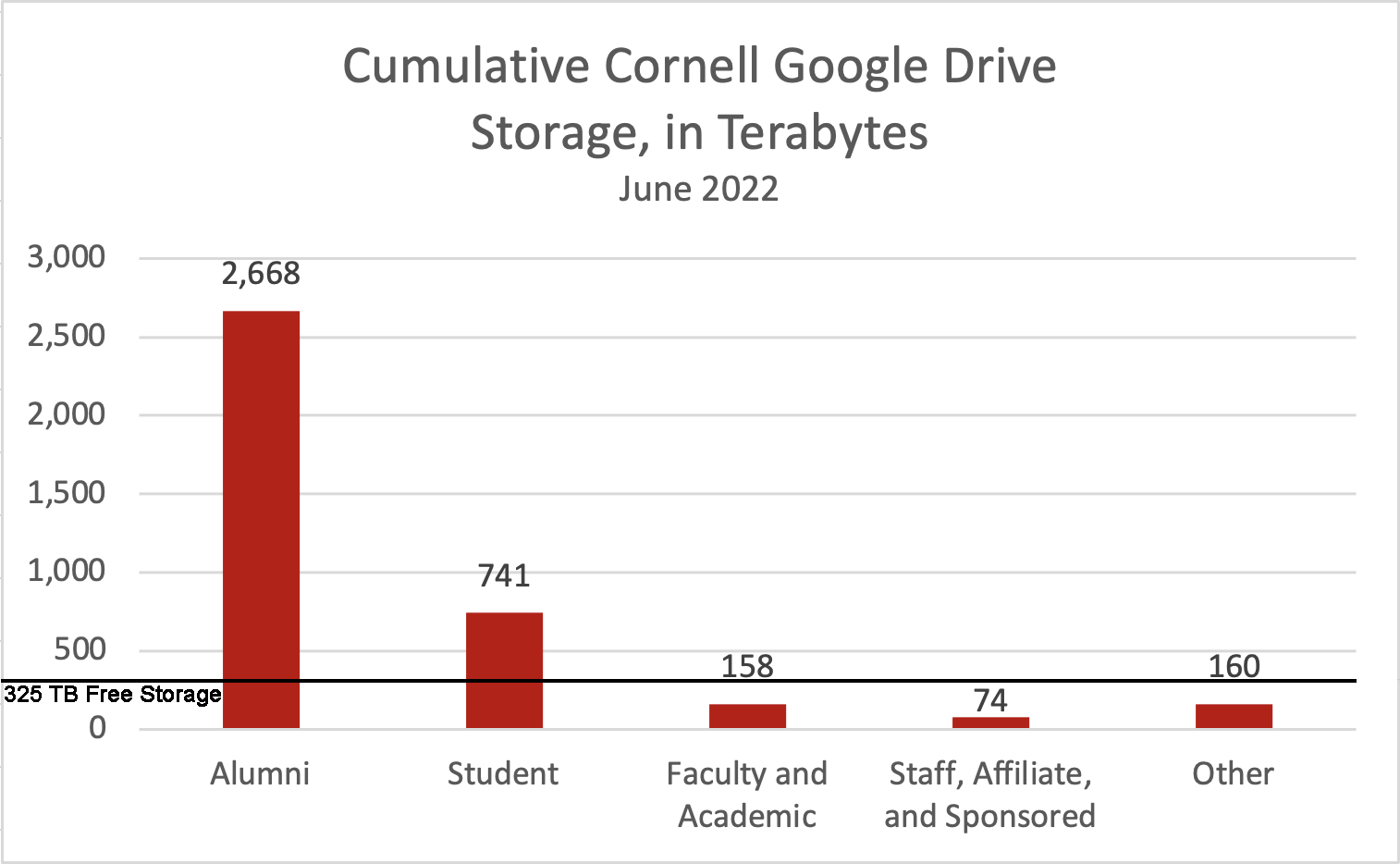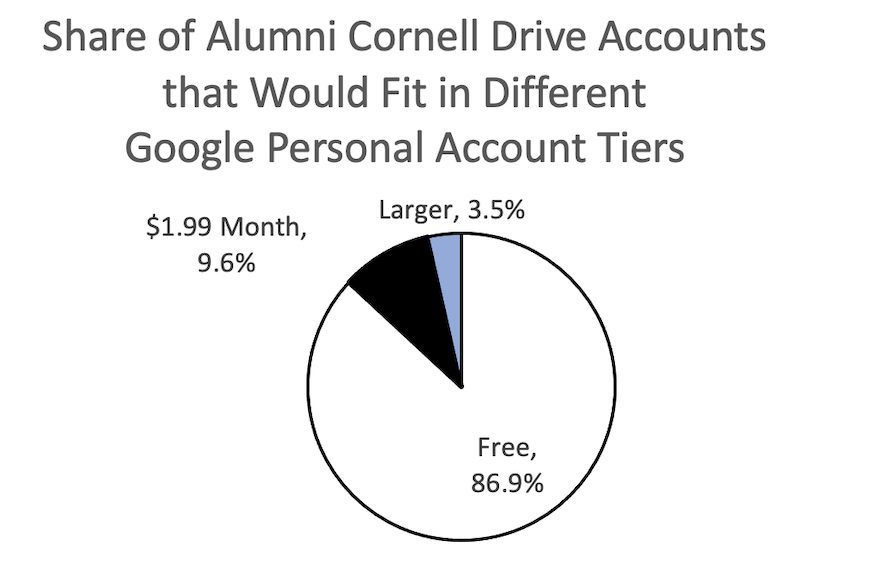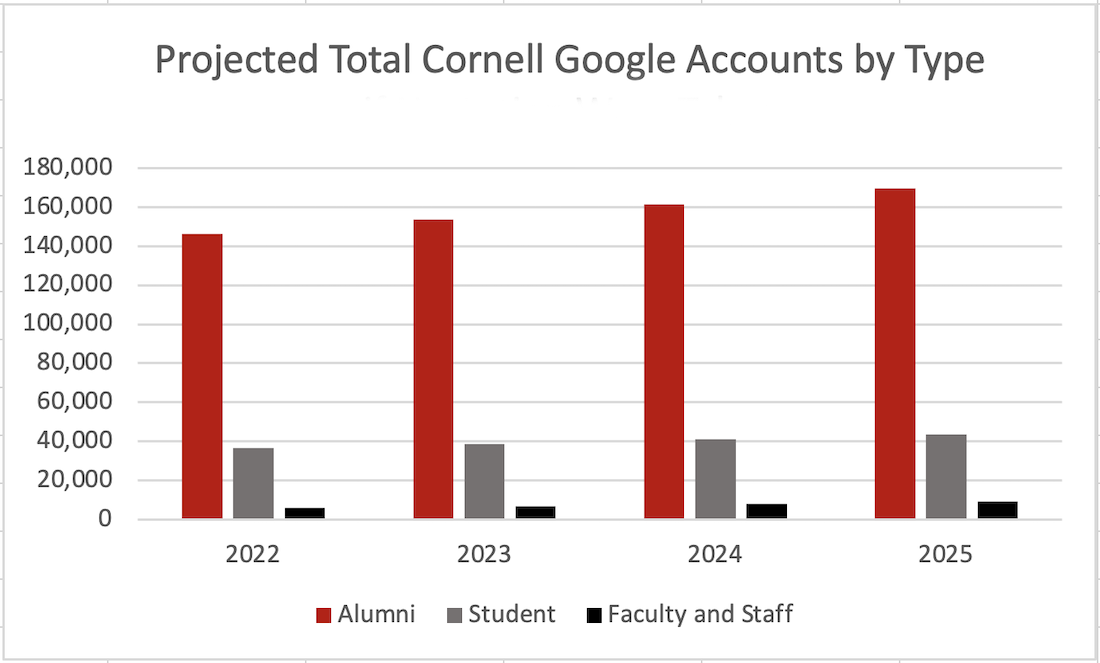Why Cornell Google Services Changed
This article applies to: Strategic Storage Initiative
Changes to Google services available through Cornell were made necessary by changes to the underlying terms Google offers the university. These changes were reviewed by Cornell's IT Governance Council and were designed to keep costs from growing unsustainably while causing the least disruption possible to Cornell's education and research missions.
Why It was Necessary to Make Changes
In early 2021, Google announced it was ending the free unlimited storage it had offered higher education. (See under "Introducing a new storage policy.") Instead, they would charge for any storage above a free allotment provided to each institution.
Cornell's allotment was around 325 Terabytes (TB), which is less than 10% of what the Cornell community had collectively stored in Google at that time.
In late 2021, Cornell and other universities paid for a contract to extend unlimited Google Drive storage. When the contract expired, any storage Cornell had above the free allotment would have incurred extra costs for the university. If no action were taken, these costs could have totaled many hundreds of thousands of dollars per year.
Moderating Growth in Faculty, Student, and Staff Accounts
After making the easiest reductions for Cornell Google Drive storage, the remaining amount was still so large that substantial costs would have been incurred unless more steps were taken. Since all remaining options would have an effect, it was important to identify which changes would be least disruptive to Cornell education and research.
- Cornell already only set up Google accounts for faculty and staff on request. New accounts are capped at 15 Gigabytes (GB)
- Google accounts are issued to students automatically, and new ones are also capped at 15 GB.
- Existing faculty, student, and staff accounts with less than 15 GB in June 2022 were capped at 15 GB. Those above 15 GB had a cap added above their current use at that time.
- When an account nears its cap, the account holder should first try to reduce storage following Google's guidance. If more space is still needed for coursework, research, or Cornell business, it may be requested.
With this approach, teaching, learning, and research activities could continue using Google or have time to transition to other services that may be a better fit.
Where Most Storage was Occurring

The amount of storage that Google indicated they would be providing to Cornell for free was around 325 TB. The more Cornell was over 325 TB when the contract ended in December 2025, the more that would have had to be paid to Google.
The number of alumni Google accounts was significantly larger and was growing faster than faculty and staff or student accounts. Projections showed a growing problem.
Google Storage for Individuals was Less Expensive than Cornell Could Obtain
Google used to offer free, unlimited storage to higher education. Cornell shared this storage to everyone who had a Cornell Google account.
Under the new Google Workspaces for Education, Google would have provided Cornell with 325 TB of no-cost storage for the entire university. If everyone who has a Cornell Google account signed up for a free personal Google account, the storage space provided to them through their free individual accounts would collectively be many times the amount Google would have provided for free to Cornell.
As a result, individuals can now usually get storage directly from Google more economically than Cornell can.
Almost All Alumni Google Storage Can Fit in Free or Low-Cost Personal Accounts
The contents of nearly all alumni Google accounts could fit in personal Google accounts that are either free or cost less than two dollars per month for an individual. These types of accounts are not available through Cornell.

Distribution as of June 2022
As of June 2022, about four in five alumni didn't use Cornell Google Drive. Of the alumni who did, nearly 87% had storage that would fit into a free personal Google account available to individuals, but not through Cornell. More than 96% could fit into a 100 GB personal account that costs $1.99 per month which is also available to individuals, but not through Cornell. It would cost Cornell much more to buy an equivalent amount of storage.
Summary and Next Steps
Google's new business model for education required an evaluation of options to avoid large new costs. Reviews were held by central IT, campus IT organizations, a new Storage Advisory Committee, Alumni Affairs and Development, and IT Governance, which brings together representatives from across Cornell.
Information was made available to help prepare for storage changes for:
To move your data (files, email, photos), see the resources suggested at Move Your Personal Data.
If you have questions that were not addressed by this page, please see General Frequently Asked Questions About Storage Changes.


Comments?
To share feedback about this page or request support, log in with your NetID